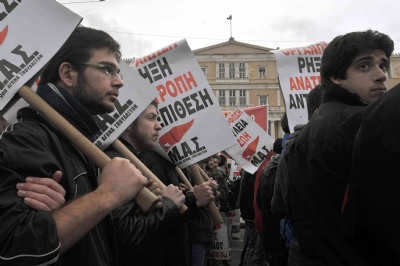
Germany and France are tomorrow expected to move to guarantee Greek solvency and to shore up the euro against assault from gamblers on the financial markets.
At a summit of EU leaders in Brussels which looks like being overwhelmed by the implications of Greece's debt and deficit emergency, Chancellor Angela Merkel and President Nicolas Sarkozy, said senior EU sources, should deliver a joint Franco-German signal that they stand ready to come to Athens' rescue if need be.
Herman Van Rompuy, the new European Council president steeringtomorrow's summit, expects the planned response to the Greek crisis to overtake an agenda focused on medium-term European economic strategy.
Signs of action buoyed financial markets for the third successive day – with the cost of insuring Greek debt falling again and European stock markets, including the FTSE, climbing after falls last week. The possibility of a rescue also eased pressure on the euro, which could lead to heavy losses for hedge funds and other speculators who have bet that the currency will collapse.
The Germans, apparently determined to avert any euro crisis, are leading the drive to concoct a Greek bailout. They may not reveal full details tomorrow, but they are certain to insist on punitive terms for loans or loan guarantees, and also may dash hopes of a "European" bailout plan in favour of bilateral pacts between national governments and Athens. Berlin is said to believe this will confer greater clout and rigour in forcing Greece to meet a bailout's terms – major public spending cuts, better revenue collection, reliable data, and reforms to the pension, health, and civil service systems.
Expectations of a Franco-German initiative hardened tonight after a day of frantic discussions in Brussels and across European capitals over what to do about Greece and the mixed signals over the timing and substance of the response.
Finance ministers of the eurozone, as well as Jean-Claude Trichet, the European Central Bank president, and Olli Rehn of Finland, the European commissioner for economic and monetary affairs, rehearsed their options by video-conference.
Sources close to Van Rompuy, conceded that tomorrow's summit had to deliver a strong message to the markets. But his eight-page paper on economic strategy sent out to government leaders for the summit omitted all mention of the crisis.
Analysts said much was riding on how EU leaders responded but those speculators betting on a fall of the euro will have to rush back to the market to cover up their "short" positions to limit their losses.
"If a deal is done and Greece is rescued, we could see a rally because a lot of people are short and they will have to wind up their positions," said Neil Mellor, a Bank of New York Mellon currency strategist.
Others said the markets were confused. "If Greece doesn't get support from the EU, the question in the markets will be why should we [buy Greek bonds]. The concern then is that knocks sentiment. The market will look at who is next, and Portugal will be next," said Gary Jenkins, of stock brokers Evo Securities.
There are divisions among the 16 eurozone countries and the 11 other EU states over whether Europe can weather the crisis or whether the International Monetary Fund should be called in. But those splits also extend to within the eurozone.
"The EU initiative must be placed in a common framework, which is that of the IMF," Belgium's finance minister, Didier Reynders, told Le Monde. "Greece has a right to assistance from the IMF, of which it is a member. If not, there is no point in being a member."
Reflecting a common view that an IMF rescue would be a grievous blow to European self-esteem and perhaps afford the Americans an inroad into ECB monetary policy-making, a senior official in Brussels said: "From a legal point of view, the IMF is possible. But politically, it's inconceivable that the IMF will rescue Greece. Because we have a monetary union, a system for supporting the currency."
As well as battling a budget deficit nudging 13% of GDP, Greece owes nearly €300bn (£264bn) to foreign banks. With French and German banks the biggest lenders, exposed to around one third of the total, Berlin and Paris appear to be reaching the conclusion that helping Athens would be helping themselves, as they would be among the biggest victims of a Greek default.














